RIYADH: Saudi artist Ethar Balkhair’s first collaboration with Kuwait-based home goods giant, Abyat, which translates from Arabic to “homes,” recently dropped in time for the holy month.
With green-tinted clear glassware, plates, gahwa cups and other accessories, Balkhair wants to help families break bread and break their fasts while enjoying a bit of her family’s story inserted into yours.
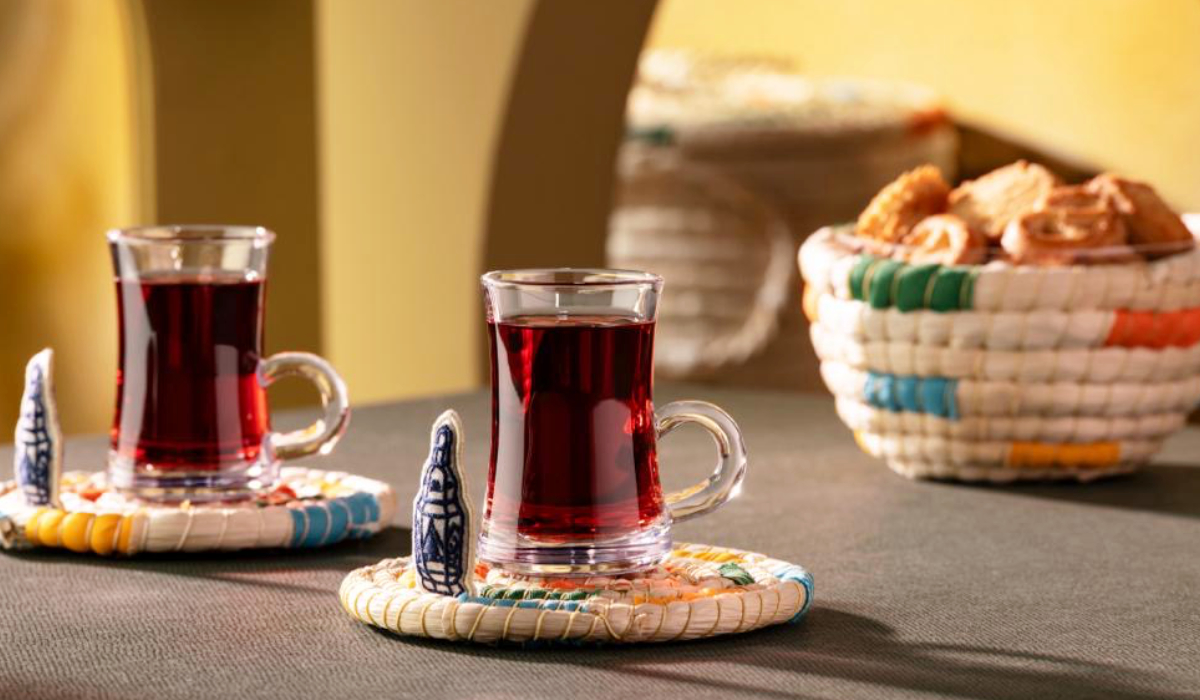
The Layaly Al-Khair collection merges vibrant and dynamic traditional elements with lively contemporary energy. (Supplied)
Inspired by meals at her late grandfather’s house during Ramadan as a child, Balkhair recalls enjoying picking out the clear but colored plates stacked on the table and watching as the color changed with the light or the food placed on top. That visual memory stayed with her and when she was given the opportunity to design this collection, she brought out elements of it into the present day. Abyat allowed her to bring her vision to the masses and share that with anyone who wished to pick up parts, or all of her collection, from their stores.
“I love to curate things on the table and to stack things,” Balkhair told Arab News. “My aim was to create a theme that celebrates the beauty of Ramadan and reflects our shared values and similarities that are at the heart of our cultural identity — in a fun and engaging way.”
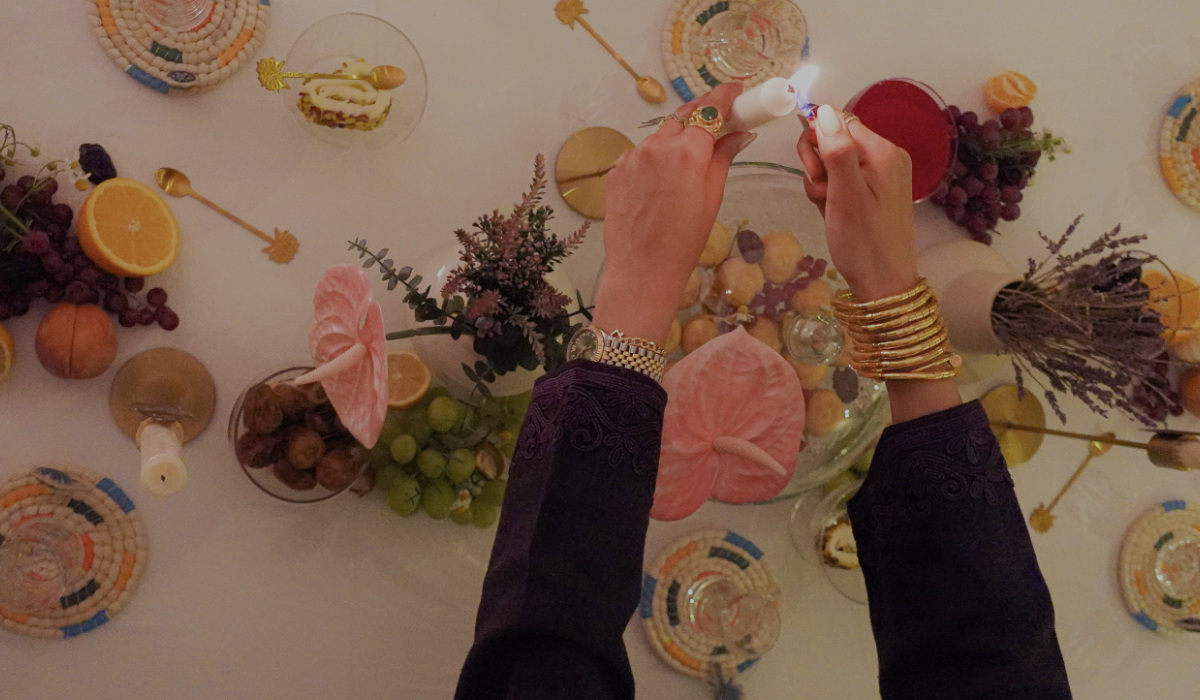
The Layaly Al-Khair collection merges vibrant and dynamic traditional elements with lively contemporary energy. (Supplied)
In this collection, she wanted to visually express the emotions that many would experience during iftar, through merging vibrant and dynamic traditional elements with lively contemporary energy. She illustrated a dancing pattern that casts a shadow of the palm tree design on the table as the light changed, or while stacked.
One of the things Balkhair loved about Ramadan was household traditions to break fast. Usually, loved ones gathered around as the call for prayer lingered in the background, seated at a communal table populated with an array of foods as the sound of the clinking of glasses and spoons filled the air before rushing to pray. She noticed how when she visited other people’s houses during the holy month, they would serve variations of the same dishes or have their own little traditions — but the rituals usually were mostly the same. She kept this in mind while designing.
My aim was to create a theme that celebrates the beauty of Ramadan and reflects our shared values and similarities that are at the heart of our cultural identity — in a fun and engaging way.
Ethar Balkhair, Saudi artist
The price point in the collection is typically under SR100 ($26); with the most expensive items selling for SR195 and the least expensive at SR32. The most popular items, the dinner plate set (which comes in a box of four), and the six-piece glass set (which has three tints of colors), each goes for SR89. The collection also has a family-style salad bowl and a fun and functional salad serve-ware set.
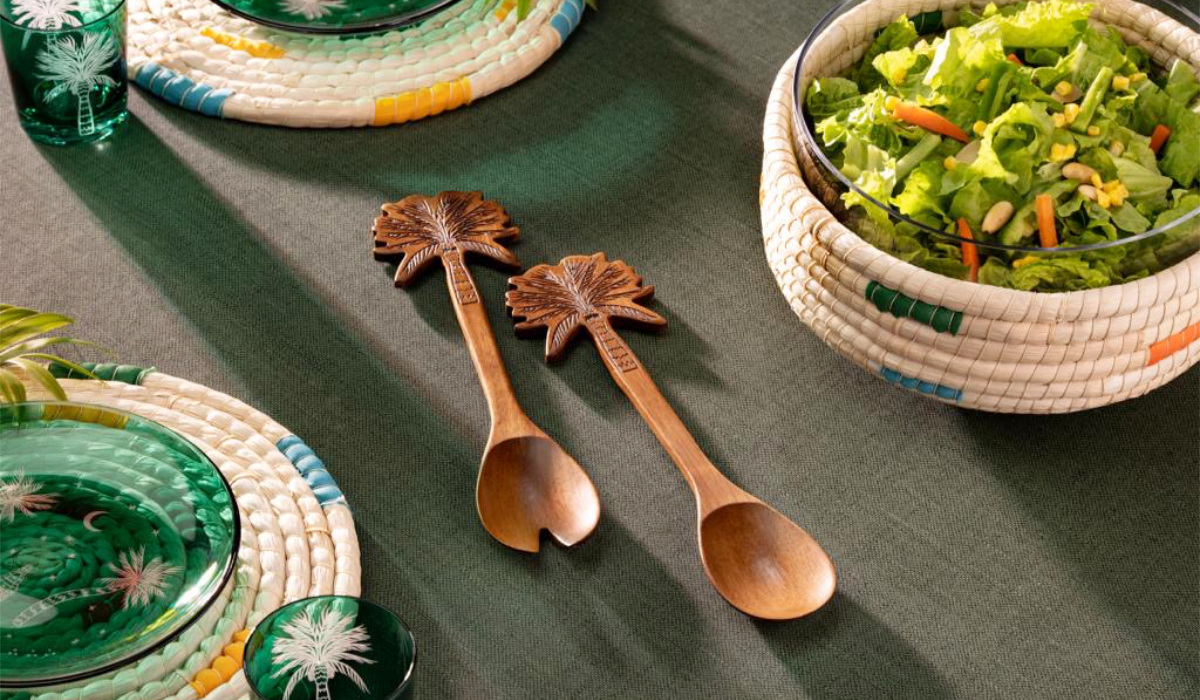
The Layaly Al-Khair collection merges vibrant and dynamic traditional elements with lively contemporary energy. (Supplied)
While Balkhair grew up in Jeddah, she was also mindful of all the other ways in which the collection could be used around the Kingdom.
The collection includes large baskets in two designs, meant to be filled with candy for the traditional practice of Gargee’an, the celebratory custom in mid-Ramadan that is mostly practiced in the Eastern Province and the neighboring Gulf countries, including Kuwait — the home of Abyat — where children would go door-to-door to exchange sweets and goodies while wearing traditional attire.
There is also a jug, a charger plate and several other options all created in what Abyat describes as the “urban modern and natural” style. The small spoons that come with the smaller dessert bowls also give nostalgic vibes, with palm trees intricately carved out in a delicate way. That palm tree, the signature symbol of the Kingdom, is also evident on some of the other plates and glasses, showcasing the Saudi narrative.
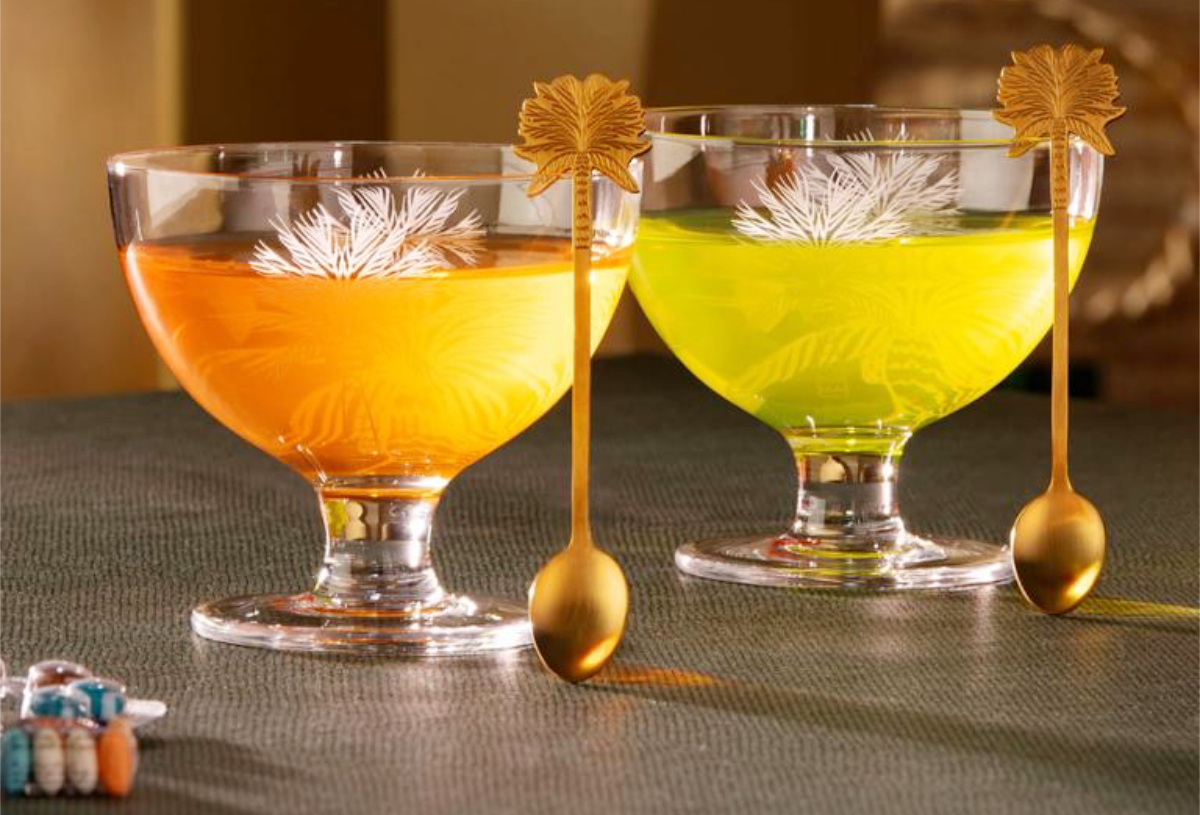
The Layaly Al-Khair collection merges vibrant and dynamic traditional elements with lively contemporary energy. (Supplied)
“I wanted the elements to reflect my life now but has the traditional feel, but with a more modern look. I wanted to make it fun so you will not get bored,” she said.
Since the dessert bowls are clear, it changes colors with whatever you put in it, whether it be a rich creme caramel or jiggly bright-red jelly.
“It’s exciting. This is the cheerful childhood emotion I want to bring to everyone’s table this Ramadan, including my own,” she said.
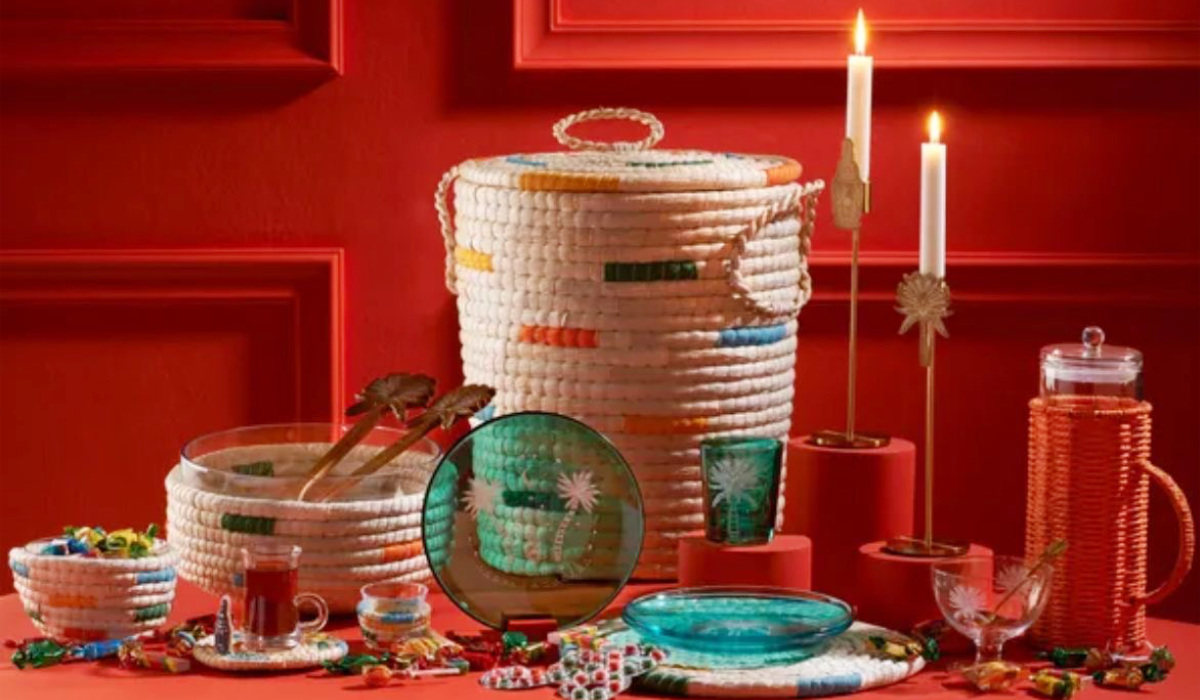
The Layaly Al-Khair collection merges vibrant and dynamic traditional elements with lively contemporary energy. (Supplied)
Of the collection, Abyat said: “The Layaly Al-Khair collection includes dining and home accessories that embody the depth of an authentic custom, where history meets the present in a beautiful scene of heritage. This collection was designed in collaboration with Saudi designer Ethar Balkhair, in support of local talent.”
Balkhair also noted how the name of the collection, which translates to “good nights” from Arabic, was derived from her family name — something Abyat surprised her with.
“My mother and father were over the moon when they realized that Abyat gave us a shout-out with the name of the collection,” she said.
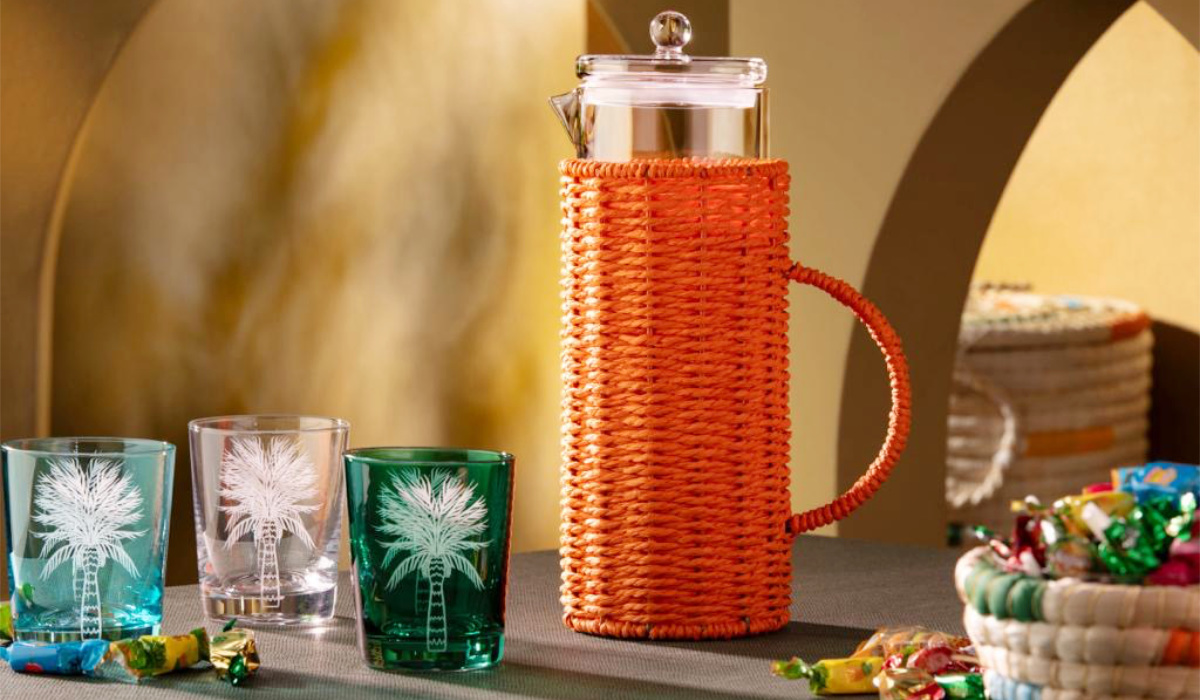
The Layaly Al-Khair collection merges vibrant and dynamic traditional elements with lively contemporary energy. (Supplied)
The two candle-holders in the collection also serve as a modern twist on the traditional fanoos lanterns.
Asmaa Gadri, who lives in Jeddah, picked up a pair of those candle-holders after seeing them at her local branch.
“I fell in love instantly when I saw them,” Gadri told Arab News. “They’re so beautiful and I’m even more happy now that you’ve told me it’s by a Saudi designer,” she said.
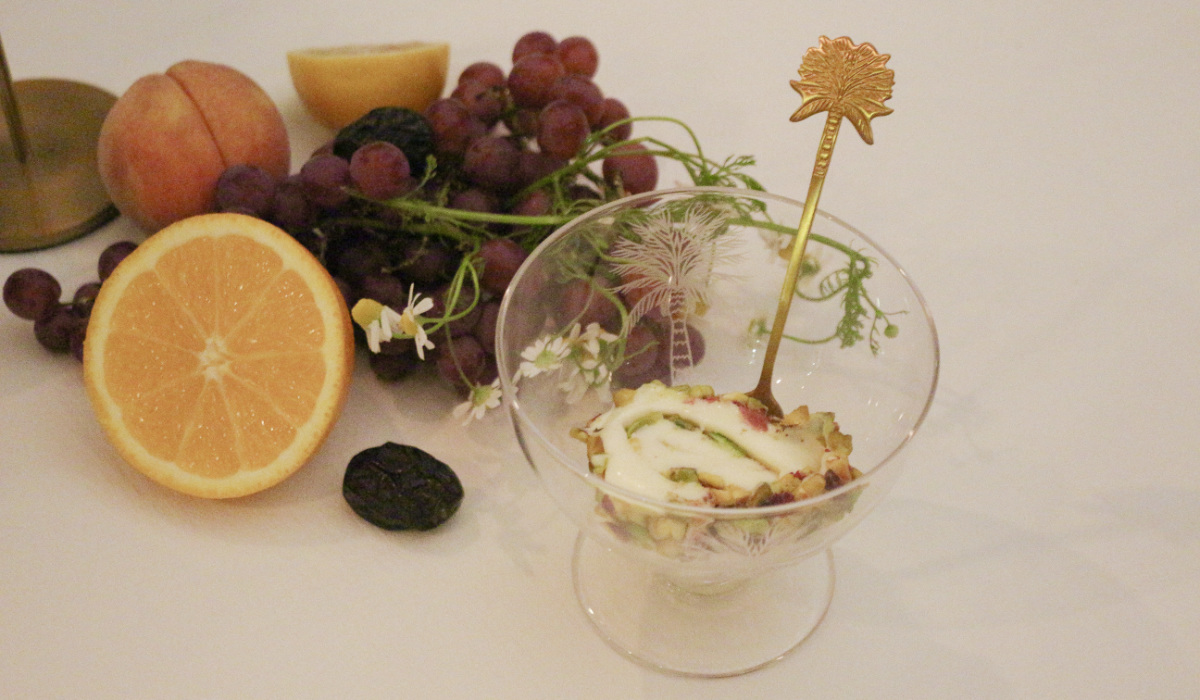
The Layaly Al-Khair collection merges vibrant and dynamic traditional elements with lively contemporary energy. (Supplied)
Balkhair has collaborated with numerous companies to create curated collections before, such as her work with Nivea Creme, Bobbi Brown and Sephora, among other brands. But in each of those collaborations, they were for niche audiences, only meant for specific customers or to be used for a limited time.
This was the first opportunity where she designed for the entire family — from the youngest to the oldest member and those in between.
Balkhair hopes people such as Gadri would consider using her collection all year long. She does not want her collection to be something to be pulled out of a box or dusty cupboard and washed to be used once a year or only on a special occasion.
“I want to connect your story to my story, I love to emit emotion and let people connect. I want to celebrate the cheerful gathering! In my childhood, Ramadan gave me joy — it wasn’t just Eid,” Balkhair said.
“I am excited to produce a product that involves things we can use daily — not only in Ramadan,” she said. “But, first, I hope people eat the best foods and have the most blessed month. I joke that Ramadan would be sponsored by me,” Balkhair said with a laugh.
The collection will be available during Ramadan at Abyat stores Kingdom-wide and online.




























